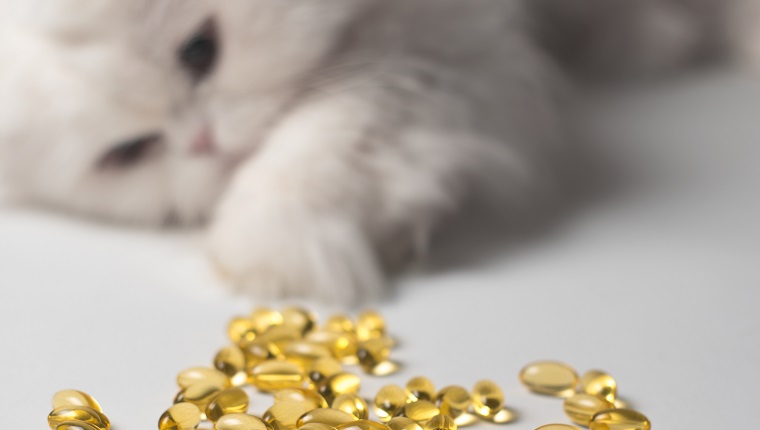Can cats eat fish oil? Maybe you’ve been benefitting from the health benefits that come from adding fish oil to your diet as a supplement and wondered whether your cat could also take it. If humans can eat fish oil, can cats safely eat it too?
The short answer is yes, cats can eat fish oil. When administered in the correct dosage, fish oil can be a positive supplement to your kitty’s regular diet that provides a number of health benefits through the presence of omega-3 fatty acids.
As always, you must ask your regular vet before sharing any human foods or supplements with your resident kitty, including fish oil. Here’s what you need to know about fish oil and cats.
How Is Fish Oil Good For Cats?
There are a whole host of benefits that fish oil can provide to your feline. The amount of omega-3 fatty acids that fish oil contains makes it a great supplement to add to your kitty’s regular meal times.
Technically, fish oil provides a high amount of the omega-3 fatty acids eicosapentaenoic acid (EPA) and docosahexaenoic acid (DHA).)
Veterinarians often recommend fish oil as a way to help reduce inflammatory conditions that a cat might be suffering from. This can include skin allergies, heart disease, and cases of arthritis.
Beyond fish oil’s anti-inflammatory properties, the supplement can also help improve a cat’s brain functions. In some cases, fish oil has been recommended as part of a regimen to halt the growth of tumors, along with tackling issues that involve irregular heart rates and seizures.
How Can I Safely Give Fish Oil To My Cat?

First of all, always consult with your regular veterinarian before adding a supplement to your cat’s diet. Your vet will be able to advise you on the appropriate frequency of dosage and the correct amount of fish oil to start feeding to your cat. They can also recommend a safe, feline-friendly brand of fish oil for your cat.
Fish oil is often sold in capsule form. If the capsules are small enough, you can administer them direct to your kitty. Although, if your cat doesn’t seem too interested in swallowing a capsule whole, you can also puncture the outer layer of the capsule and add the fish oil inside directly to their regular meals.
When feeding fish oil to your cat, it’s vital that you adhere to the dosage and frequency your vet advises. Too much fish oil could bring about a number of side effects, including diarrhea, vomiting, and the presence of a noticeably fishy odor on the kitty’s breath.
Has your cat benefited from you adding fish oil to their diet? What positive effects have you seen? Tell us all about it in the comments section below!









